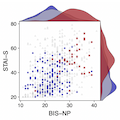Abstract
Trait impulsivity—defined by strong a preference for immediate over delayed rewards and difficulties inhibiting prepotent behaviors—is observed in all externalizing disorders, including substance use disorders. Many laboratory tasks have been developed to identify decision-making mechanisms of impulsive behavior, but convergence between self-reports and laboratory task measures of impulsivity are consistently low. Longstanding theories of personality and decision- making predict that neurally mediated individual differences in sensitivity to reward cues versus punishment cues (frustrative non-reward) interact to affect behavioral tendencies. Such interactions obscure 1:1 correspondences between single personality traits and task performance. We use hierarchical Bayesian analysis in three samples with differing levels of substance use (N=967) to identify dependencies between trait impulsivity and anxiety on impulsive decision- making. Our findings reveal how anxiety moderates impulsive decision-making and demonstrate benefits of hierarchical Bayesian analysis over traditional approaches for testing theories of psychopathology spanning multiple levels of analysis.
